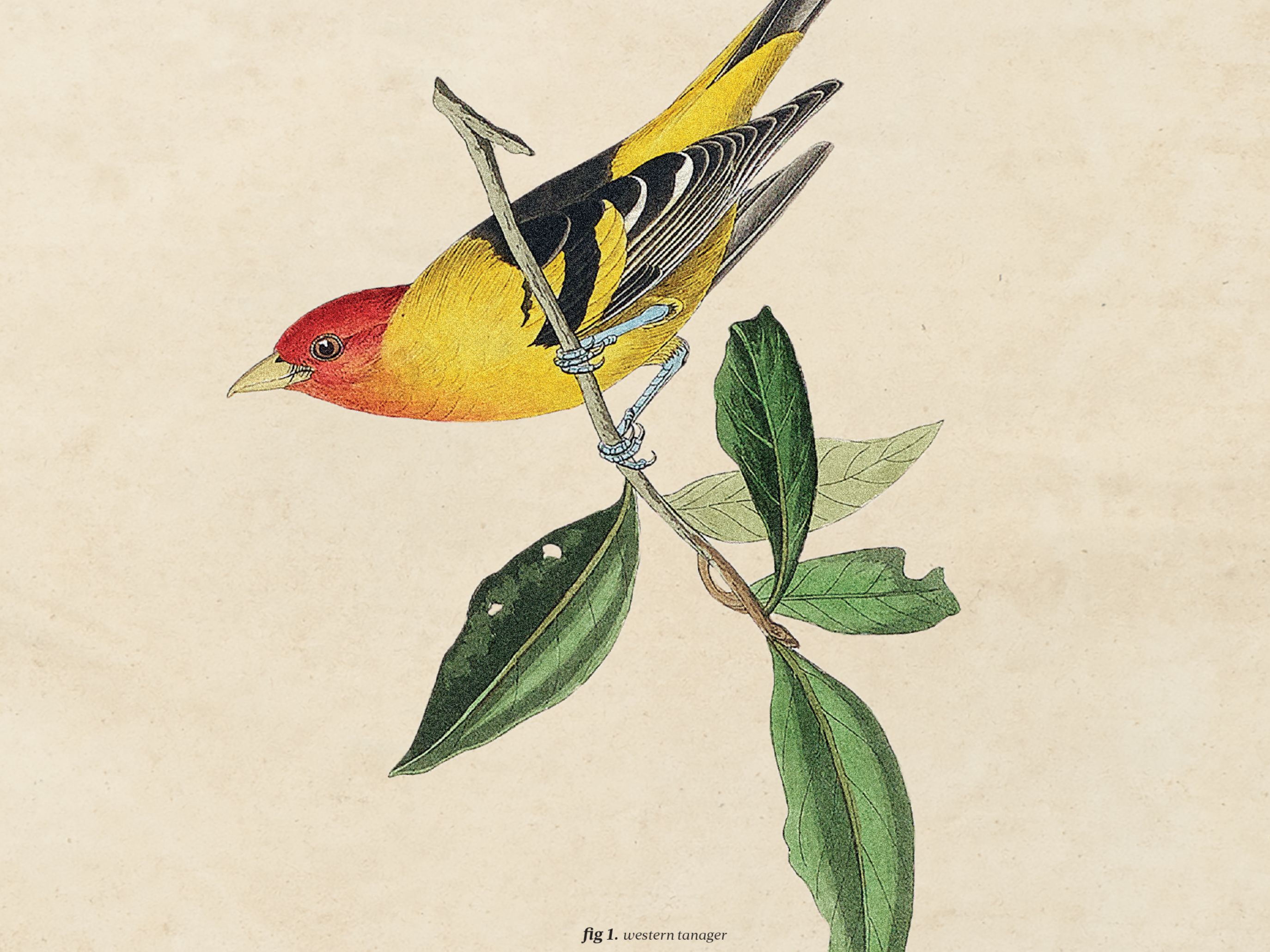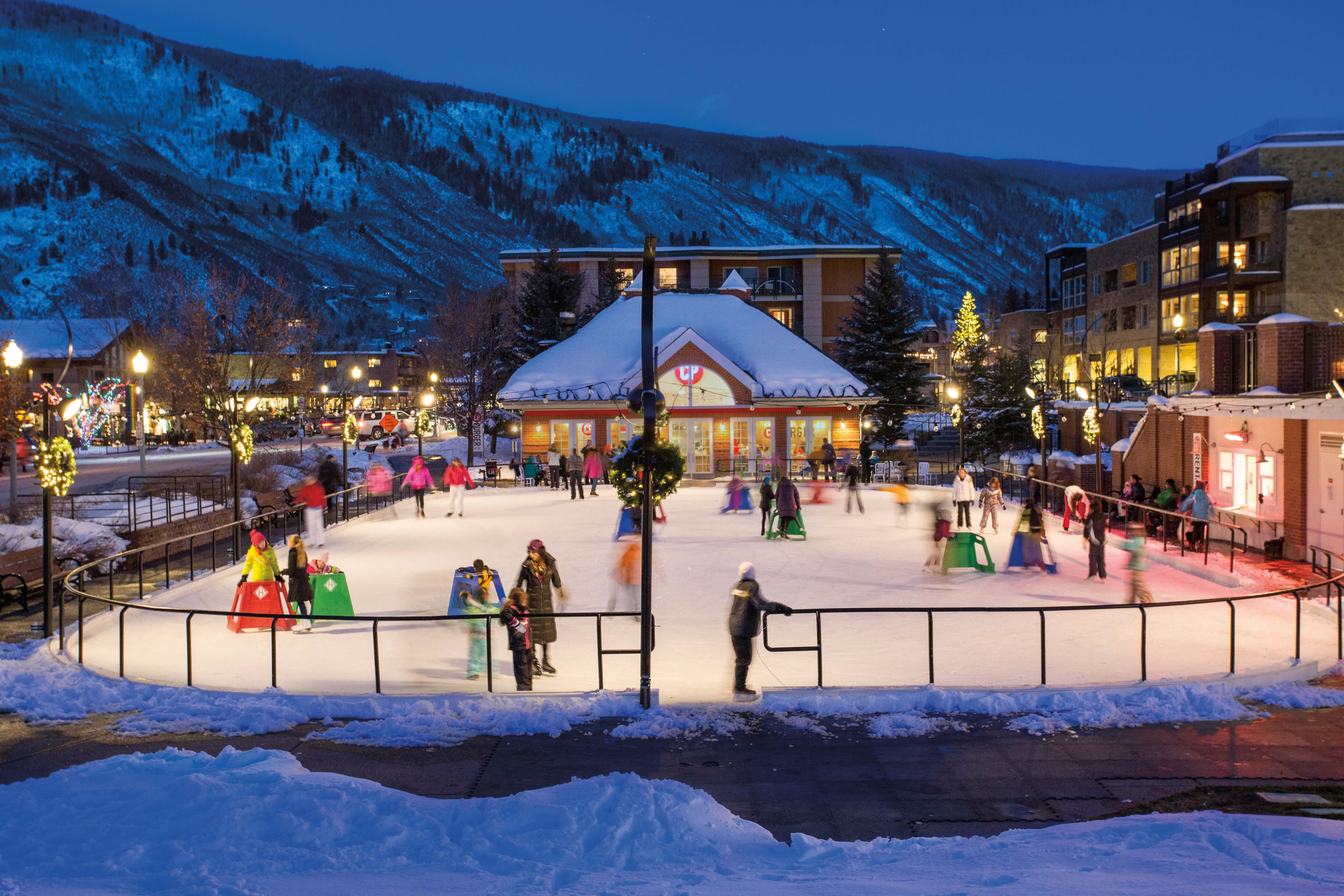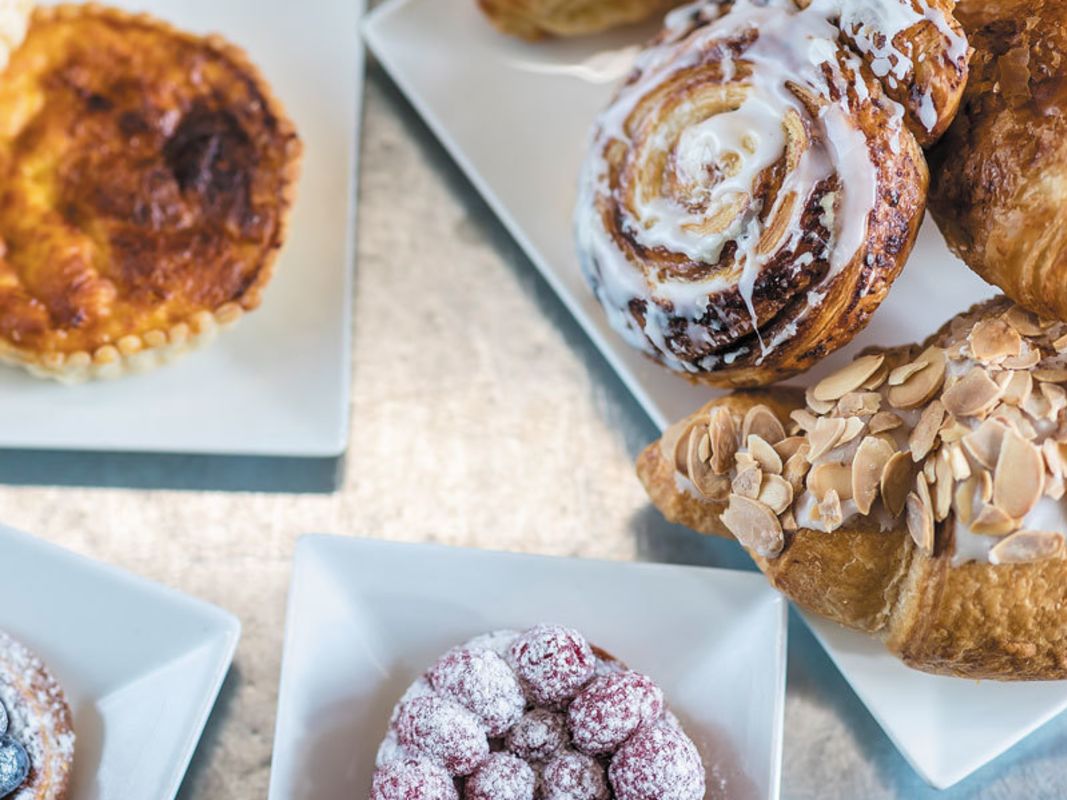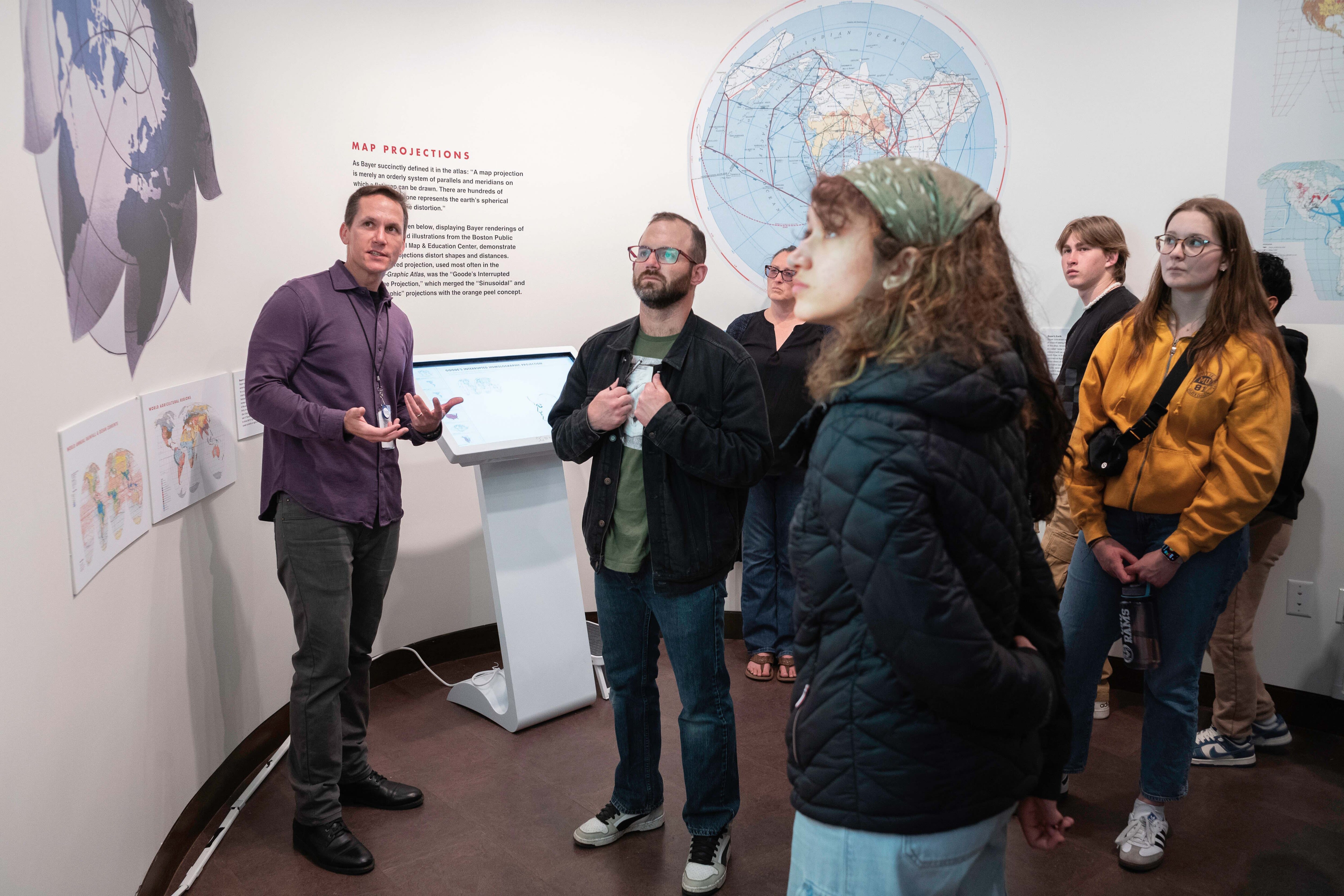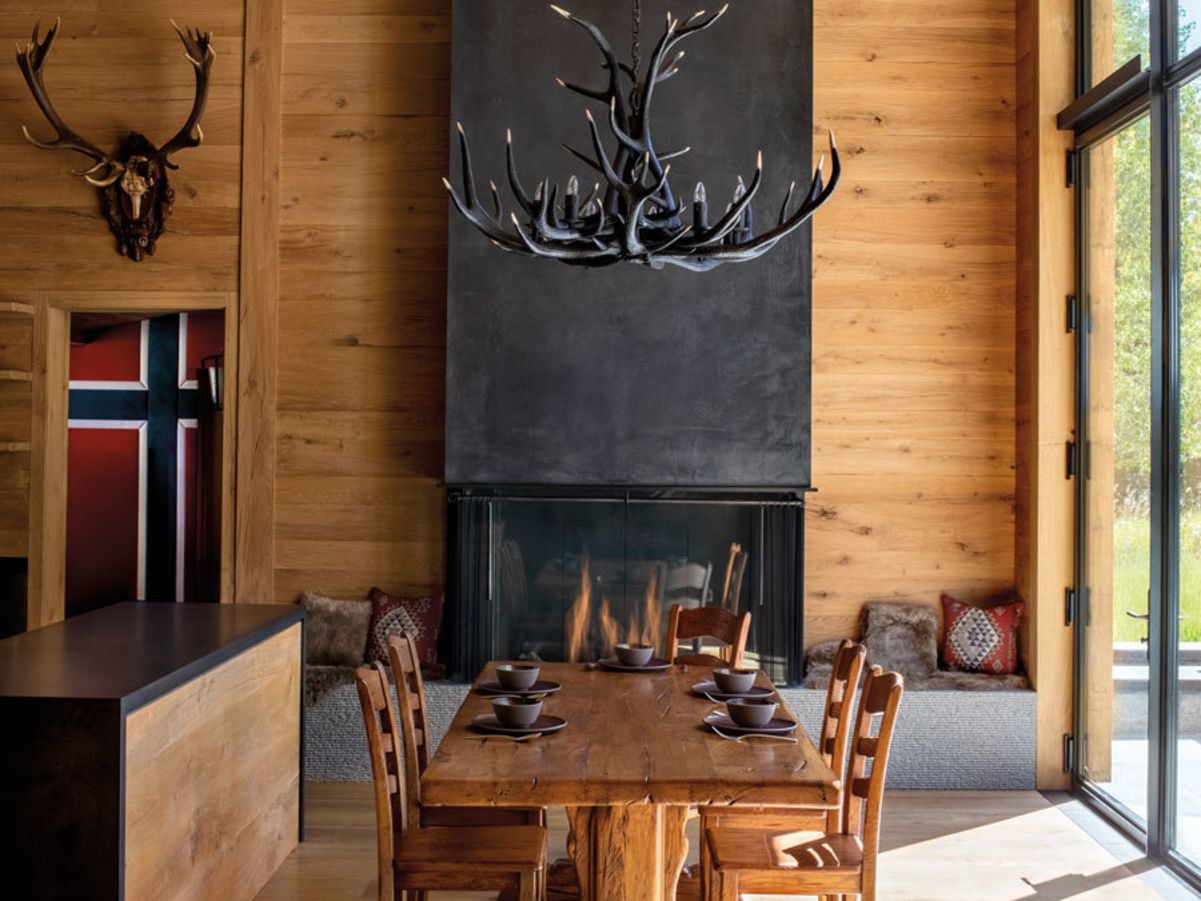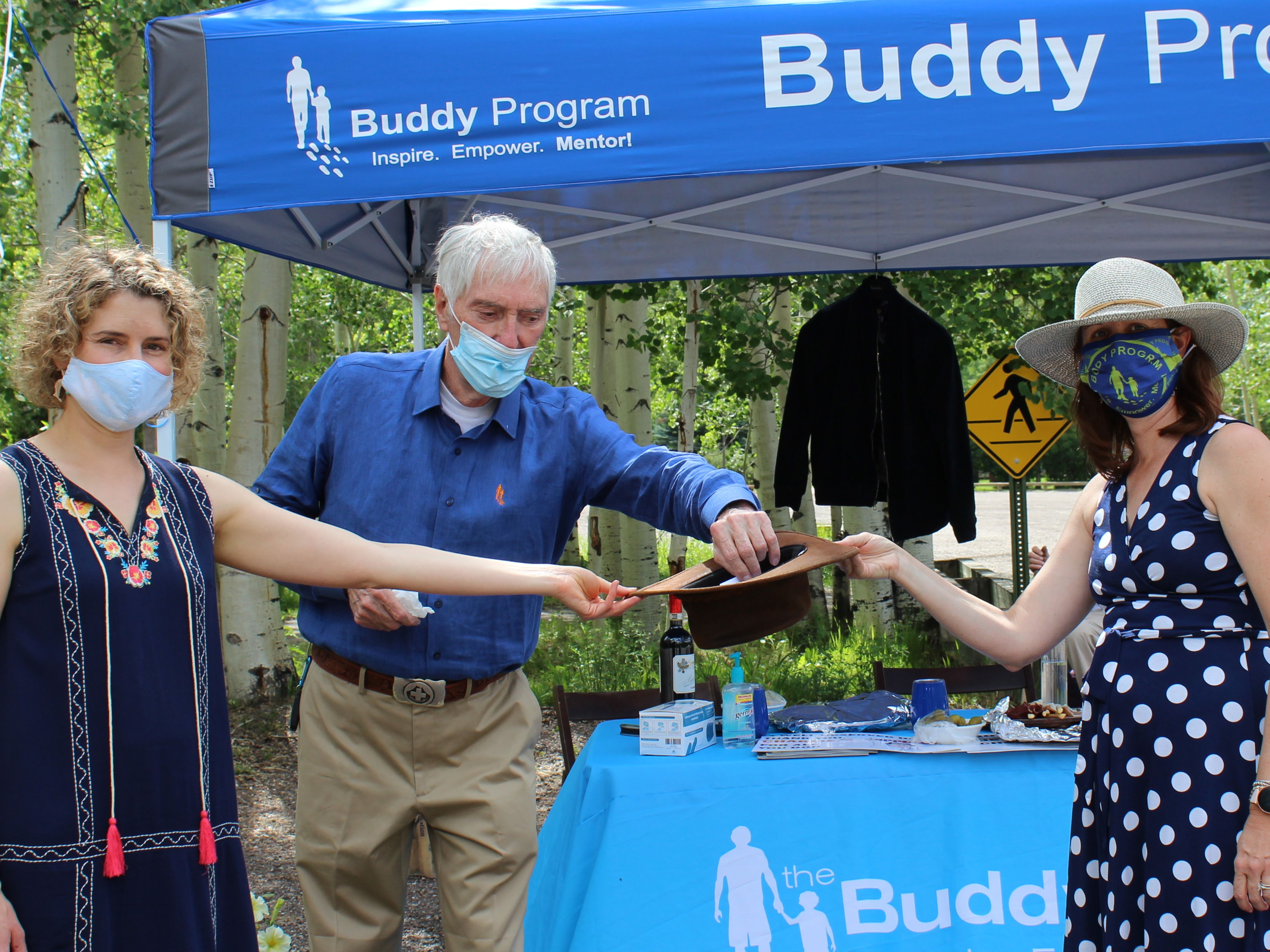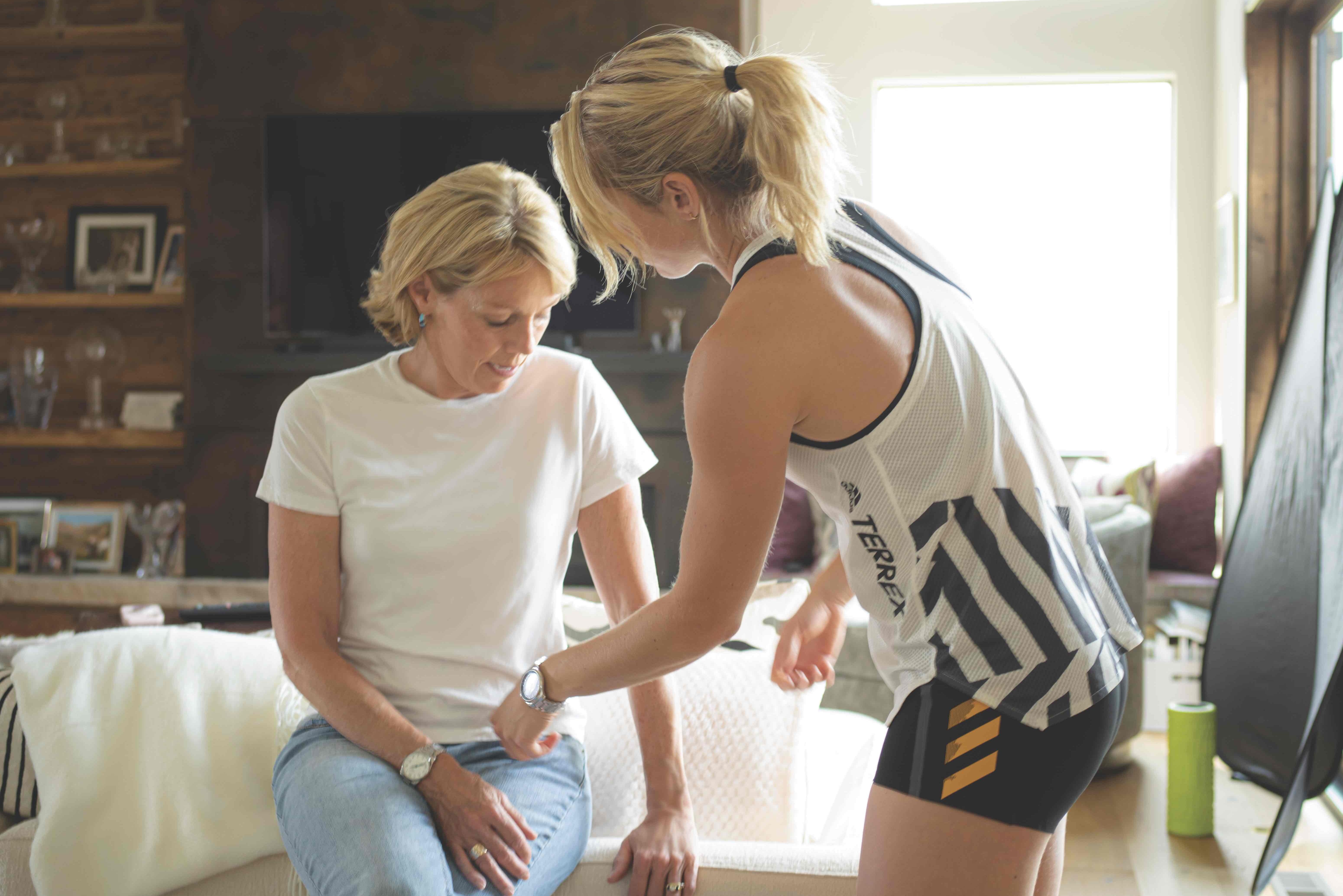
At Home with the Shiffrins
Just before 4 on an August afternoon in Edwards, Eileen Shiffrin is seated in her living room engrossed in describing the methodical process of raising the best ski racer in the world—when, suddenly, the best ski racer in the world bursts through the front door. “Mikaela, come and say hi!” she shouts to her 26-year-old daughter, who lives with her. Mikaela says a quick hello as she scurries inside, apologizing that she must head out again because a friend and neighbor (LEKI rep Charlie Webb) is helping to custom fit her shin guards, early preparation for the upcoming winter. Still almost three months out from the first World Cup race and six months from the 2022 Olympic Winter Games in Beijing, Mikaela already is feeling the crush—and rush—of expectations. Mom flashes a knowing look, then returns to her story.
Some of these tales Eileen has told many times before. Others she is still figuring out how to tell. This will be her second season as a single parent, following the sudden death, in February 2020, of her husband of 34 years, Jeff, a Vail Health anesthesiologist. She enjoys reminiscing about how she and Jeff brought up Mikaela and her brother, Taylor, who is two and a half years older. That Mikaela turned into an Olympic champion wasn’t quite unintended, but neither was it their goal.
“We just had so much fun skiing with them,” she says matter-of-factly. “But people are always trying to model their program after how we did it. Stop right there! Parents need to calm down and enjoy the process when their kids are little, whatever the sport.”
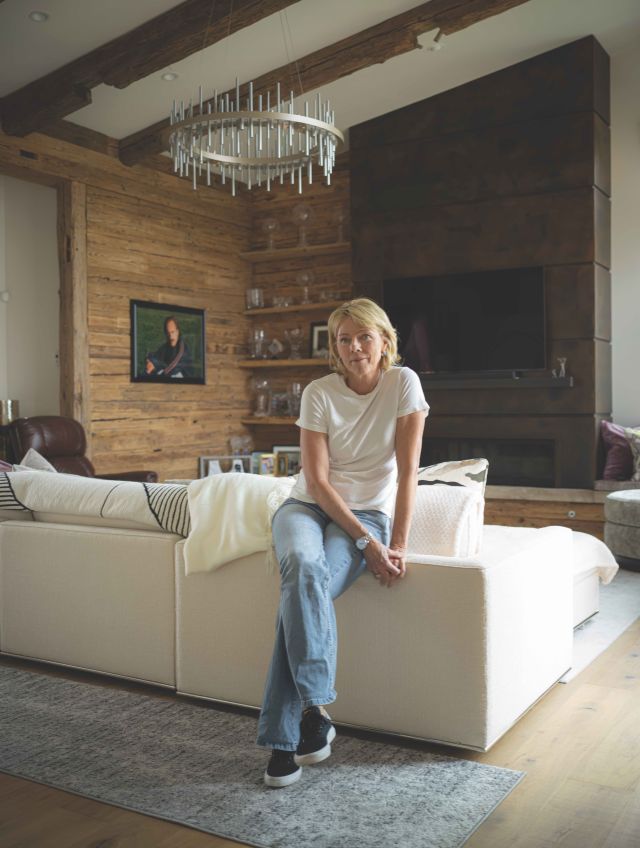
Eileen Shiffrin at home in Edwards
Image: Brent Bingham
Gone for more than a year now, Jeff’s mustachioed countenance beams in framed photos found in nearly every room of the meticulously decorated, five-bedroom mountain modern home the Shiffrins built to replace their longtime family compound in nearby Eagle-Vail, where Mikaela and Taylor grew up. Mikaela designed the bronze fireplace, Eileen says proudly; many of her crystal globes are displayed downstairs, backlit and inset on a stacked-stone-wall trophy case. The three of them moved in during the summer of 2019, eight months before Jeff died. Eileen says adjusting to Jeff’s loss “was like getting a torpedo in the head and gut, over and over, for months on end.” They don’t often talk about the pain they felt—and still feel. “We learned quickly that people have their crosses to bear, and they aren’t everyone else’s crosses; they’re the ones we have to bear ourselves. You learn to suffer in silence,” she allows.
Despite that grief and how it has shaped their lives, the Olympics beckon. For Mikaela, the Beijing Games represent her third and perhaps best chance at maximizing her potential on the sport’s most storied stage—which would mean winning multiple gold medals, after winning one in each of her prior two Games. As a racer expected to compete in up to five disciplines, all of which she has won before on the World Cup, Shiffrin will again be the face of the U.S. delegation. Eileen, who has been at her daughter’s side on the slopes since Mikaela was in kindergarten, will fill the same role as always, but this time Jeff will not. Win or lose, their usually private family will turn a pivotal page under the watchful eyes of the world.
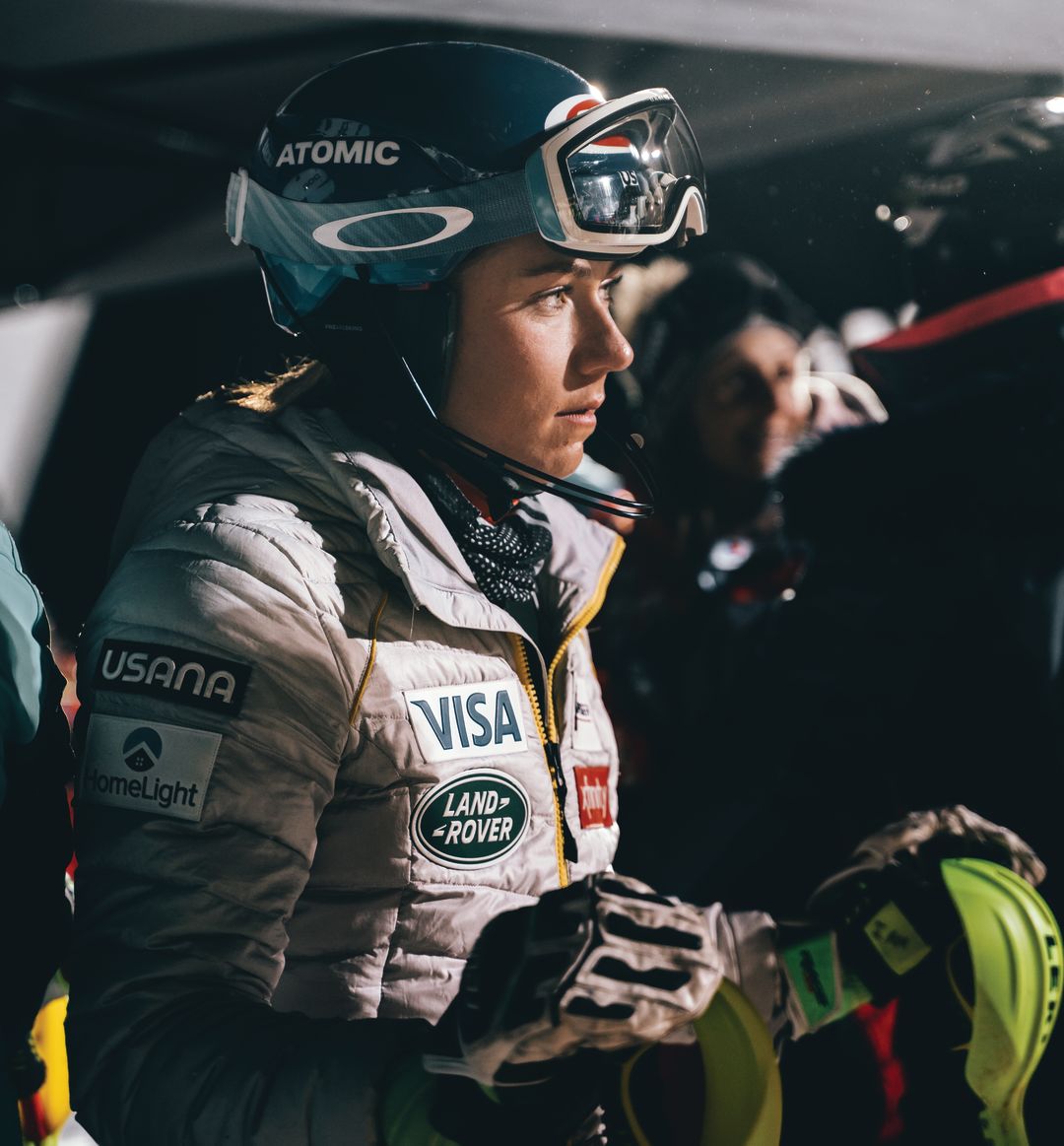
Three weeks before her father died, Mikaela Shiffrin was on pace to win her fourth straight World Cup overall title at the Audi FIS Alpine Ski World Cup in Flachau, Austria, on January 14, 2020.
Image: Max Hall/U.S. Ski Team
To appreciate the void left by Jeff’s death—the result of a head injury sustained in a fall—and understand why his absence weighs so heavily on his daughter’s ski racing career, you must consider the dawn of Team Shiffrin. In the summer of 1985, Jeff and Eileen were working at St. Elizabeth’s Medical Center in Brighton, Massachusetts. He, a 31-year-old rising-star physician, was completing his cardiothoracic rotation; she, a 25-year-old ICU nurse, found him to be “brilliant and jovial and curious, with a solution to every problem.”
Eileen had skiing in her blood. Every fall while she was growing up in the Berkshires, her parents drove her and her three siblings up to Mt. Greylock, a pasture with two rope tows. They used sickles to cut the meadow grass and prepare the slope for snow. Eileen skied on hand-me-down gear and wore jeans, leather boots, and a black trash bag when it rained. She intended to race in college, but gave up the sport when she started nursing school. Jeff, a former FIS racer from Dover, New Jersey, took her on a date to Killington and convinced her to give it another chance. They took their first vacation as a couple to Aspen, one of the reasons why Eileen has professed “a fondness and nostalgia” for the town ever since. “If it wasn’t for Jeff, I wouldn’t have kept skiing,” Eileen says. “He brought back my love of the sport.”
They married in 1986 and moved to Vail five years later, each taking a job at the Vail Valley Medical Center. Taylor was born in 1992; Mikaela arrived in 1995. Jeff and Eileen taught their kids to ski and schooled them on family outings at Vail for years before enrolling them in what was then Ski Club Vail when they were 9 and 7.
Under the tutelage of SCV’s Rika Moore, who coached a program developed by the club’s Deb Flanders, the Shiffrin children progressed rapidly. Mikaela learned to clear slalom gates before most coaches even let their kids try. Jeff’s career and their family ties eventually took them back to New England, where the kids found a home at Burke Mountain Academy in Vermont’s Northeast Kingdom. Even after their family returned to Vail in 2009, Mikaela went back to Burke, and Eileen went with her, homeschooling Mikaela in a rented condo while monitoring her training.
Mikaela kept getting faster, and her parents tried hard to keep her grounded. They forbade her to study the scoreboard after her wins, which included a sweep of the prestigious Topolino races in Italy when she was 14. She wasn’t allowed to celebrate. “It’s rude and inconsiderate,” they’d say, not to mention an inefficient use of time. Jeff’s cardinal rules—“Be nice. Think first. Have fun.”—were so ingrained that after his death, Mikaela had them printed on a sticker and affixed it to the back of her helmet. He told his kids every day, “Enjoy the process,” which deemphasized results. Eileen and Jeff developed their own language when communicating about skiing with Taylor and Mikaela. “Knees to skis, take it deep,” they’d say. Or, simply, “swallow!”—an SCV drill modeled after the bird and how its wings tip side to side in flight.
Eileen always kept her finger on the pulse when it came to their effort and performance. She wasn’t a whip cracker, but she knew exactly what each of her kids was capable of. If she felt they were falling short, she simply let them know: it was always their choice whether to put in the work required to reach their potential. “And that,” says Taylor, who won two NCAA team titles with the University of Denver, “was all that was needed.”

Mother and daughter time
Image: Brent Bingham
In March 2011, the spring of Mikaela’s freshman year of high school, the U.S. Ski Team called up its prize prospect for a pair of World Cup tech races at Spindleruv Mlyn in the Czech Republic. Eileen would soon become Mikaela’s full-time traveling companion, but Jeff accompanied her on this trip, facilitating every detail. She placed 32nd in slalom, narrowly missing a second run.
The trip revealed what it took to compete at the highest level, but they also enjoyed tender moments as father and daughter, strolling around Prague and analyzing video together. “I can’t imagine what it would have been like if he wasn’t there,” Mikaela says.
Mikaela went on to win the U.S. national title in slalom that spring, at age 16, qualifying for a full season on the World Cup. A few months later, she and her parents sat on their couch in Eagle-Vail to discuss how it would work. Mikaela and Eileen already studied video together every day, by phone or in person, and were basically best friends. Given his duties as a physician and associate professor at the University of Colorado, Jeff knew the only logical plan for their family was to have Eileen join Mikaela in Europe and for him to handle logistics from Vail, booking flights, lodging, and rental cars and eliminating distractions so they could focus on skiing. Mikaela came to call him “the Schedulizer.”
Eileen, who quit nursing when she had Taylor, facilitated Mikaela’s schoolwork on the circuit. Jeff used all of his PTO to visit them with Taylor, who raced on the NorAm tour in addition to his time at DU. The family considered moving to Europe to be together—Jeff even looked at jobs—but they loved Vail too much to leave.
The highlight of their year was their two-month-long summer reunion. “We have always loved being together,” Eileen recalls in her living room. “We never cared if our kids were not part of the clique. We’re the family that likes to play Rummikub. We don’t feel like we have to be out on the town. Especially with Mikaela being [famous], we never felt like we needed to go downtown and kind of show her off or have her show off. People think we’re weird because we’re private, but the lifestyle is exhausting. So when we could be together, we wanted to be.”
As Mikaela’s career took off and the World Cup titles started piling up, the Shiffrins invited a small circle of friends to join them for celebratory dinners at the end of each winter. They’d toast a successful season, getting home safely, and enjoying the process. They never toasted her individual achievements.
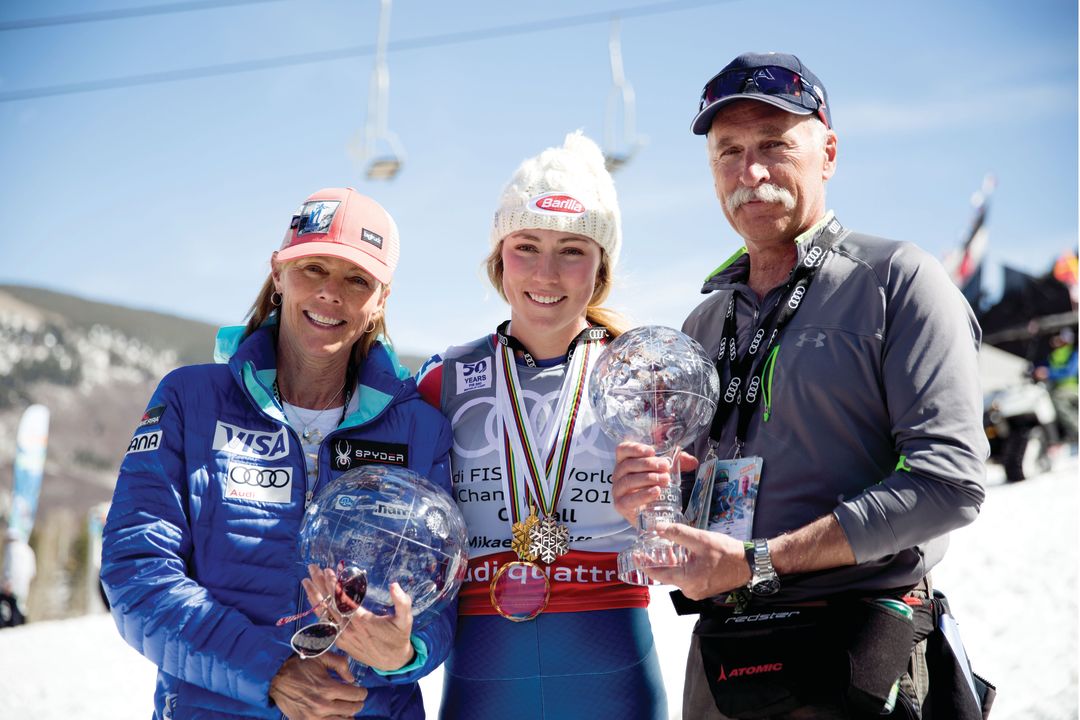
Team Shiffrin at the 2017 World Cup Finals in Aspen; after a second-place slalom finish, 22-year-old Mikaela became the youngest ski racer to win the overall World Cup title since 2003.
Parents rarely coach full time on the World Cup—and when they do, fathers are more likely to hold that job. (Slovenian racer Ilka Stuhec’s mother is the only mom who fills nearly the same role as Eileen.) Eileen deflects credit during interviews, yielding to Mikaela’s two U.S. Ski Team coaches, Mike Day and Jeff Lackie, who work exclusively with her. But those who know Eileen and understand the sport describe her as a student of ski racing the way Billy Beane is a student of baseball: obsessed with the obscure, perennially seeking the tiniest edge. She studies every racer in the field and has an acute eye for technique and speed, specifically what makes a ski racer fast. She won two national titles as a masters racer in the ’90s and competed in the local beer league for years, picking the brains of fellow diehards daily. Though she maintains her basic coach’s license from the U.S. Ski and Snowboard Association, Eileen Shiffrin is more of a natural sage than a trained evaluator. This also extends to her role as a motivator.
“I’ve always said Mikaela knows her body and herself better than anyone except maybe her mom,” says Lackie, a former Canadian national team coach who specializes in the speed disciplines. “Eileen doesn’t coddle Mikaela, and yet she protects her. It sounds like a contrary thing, but it’s not. Creating a sense of urgency and pushing her whenever she senses Mikaela is becoming complacent is a defining feature.”
“Mikaela needs Mom more than anyone,” adds Taylor, 29, who lives in Denver and works as a data scientist and entrepreneur. “Why that is the case, Dad and I had a lot of theories. We never talked a ton about it, we just knew: of course Mom has to be there.”
Despite Team Shiffrin’s success, Eileen always yearned to return to nursing. So in 2015, soon after Mikaela turned 20, they decided to try a new system. Mikaela would “spread her wings and take off,” as Eileen puts it, while Eileen would retire from coaching and resume her chosen profession. An early December race in Åre, Sweden, was to be the first in Mikaela’s World Cup career where neither of her parents would be present. Eileen settled in to watch from her mother’s house in Massachusetts at 4 a.m., when the text barrage began. Mikaela, her eyes watering and blurry from an allergic reaction to cheap makeup, had crashed while warming up in windblown snow, tearing her MCL. “I almost threw up when I found out,” Eileen says, recoiling at the memory. Mikaela missed much of the season. She still believes she wouldn’t have crashed if her mother had been there to remind her to be careful on the uneven surface.
Eileen rejoined her daughter on tour once Mikaela returned to competition, and they decided to scrap the retirement plan. The system produced prolific results for the next four years, including a breakthrough 2017 season when Mikaela clinched her first overall title at World Cup Finals in Aspen. Then, in October 2019, Eileen’s mom—Mikaela’s “Nana” and biggest fan—died. Eileen and Jeff decided maybe it was time to try retirement again. Eileen leaned on Jeff as she grieved her loss at home. Across the Atlantic, Mikaela’s skiing deteriorated. She finished 17th in a race in Courchevel, France, that December, an alarming result for the three-time defending overall World Cup champion.
Eileen returned to Europe once more, and Mikaela podiumed at seven of the next 10 races, winning four. Her streak culminated on the feared speed track of Bansko, Bulgaria, the last week of January 2020—with her father in attendance. “Bansko was the one place Jeff had always wanted to see Mikaela compete,” Eileen says.
Jeff watched his daughter win her first two speed races of the year, one downhill and one super-G, while placing fourth in a second downhill. She was in prime position to claim her fourth consecutive overall title.
After the Bansko races, Jeff joined Eileen and Mikaela for a few days of rest in the resort town of Lake Garda, Italy. They had come to Lake Garda as a young family 18 years earlier to windsurf, and Jeff and Eileen reminisced about that trip while walking around the lake. “We loved having him there,” Eileen says. When they said goodbye, they planned to see each other in five weeks.
Two days later, while training in Folgaria, Italy, Mikaela received a call from Taylor asking to talk to their mom, whom he hadn’t been able to reach. Taylor told Eileen that his father had fallen and she and Mikaela needed to come home immediately. They all got to be together once more before Jeff died on February 2.
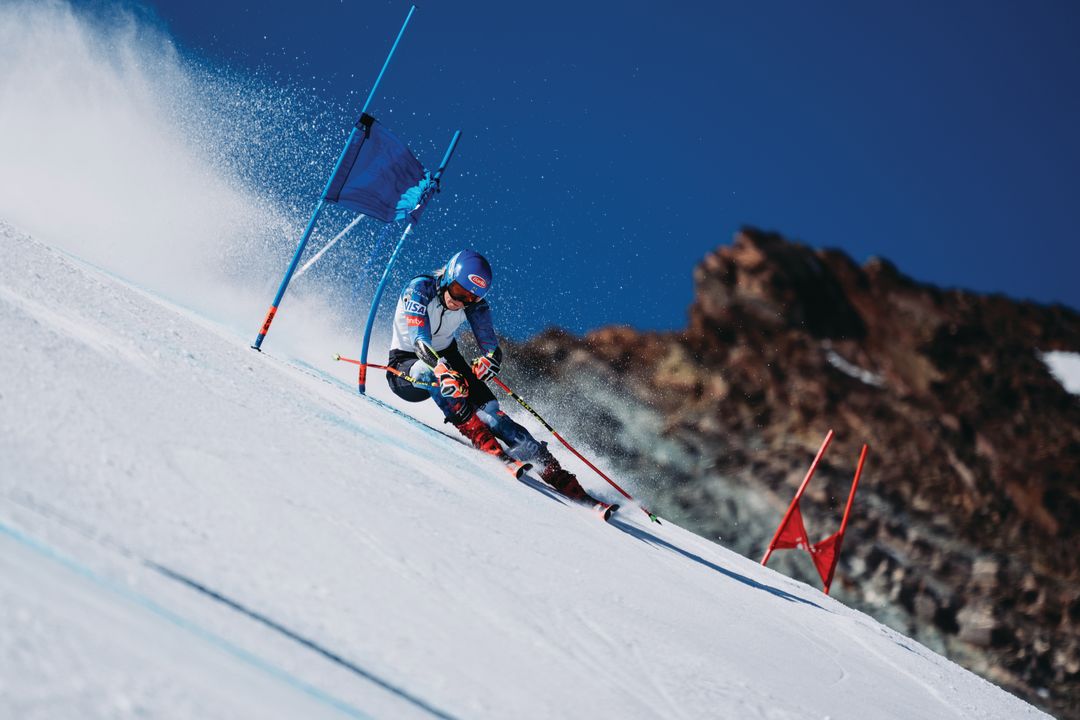
Mikaela Shiffrin training for the 2022 Winter Games with the U.S. Ski Team at Saas-Fee, Switzerland, in September
It’s just after 5 o’clock when Mikaela returns home from her shin-guard fitting. The Olympic champion nestles into the couch with an orange seltzer, wearing red nail polish. She and her mom immediately start reciting the chronological arc of her early career. After a couple of minutes, Eileen gets up from her chair and walks over to sit with her daughter on the couch. They’re both wearing white tank tops and still bear a striking resemblance to each other—wavy blond hair, sparkling eyes, movie-star smiles.
In a few weeks the circus will begin anew: Saas-Fee, Switzerland, for training with the U.S. Ski Team, then home for Taylor’s September wedding at Piney Lake and a handful of preseason fundraisers, then to Austria for the start of the season in early October, everything building toward China in February. The Olympics are a huge question mark logistically; according to word the Shiffrins received from local coaches, last year there were only three days in all of February when they could have staged alpine races due to high winds at the Olympic venue. They’ll be trying to pull off 11 races in two weeks this year.
Eileen regularly steels her daughter for a roller coaster ride, figuratively and emotionally. At an age when a lot of her friends are retiring, Eileen, 62, is as busy as she has ever been. She’s also still heartbroken. “We’re not over the grief,” she says on the couch. “You don’t get over the grief,” Mikaela adds, “but you get over a hump.”
“And you find a way to survive it,” Eileen says. “Especially when you have a community like this. It did help, a lot. People came out of the woodwork to say, oh, your microwave’s broken, don’t worry; we can help with that, we can help with this.”
Mikaela won two World Cup races and four medals at the world championships last winter, including gold in combined, but finishing third overall amounted to a disappointing campaign for such a decorated champion. “She was finding her way back,” says Day, who handles her technical program. “I think last year was survival to a certain extent.”
Now, Mikaela is fitter than she has ever been going into a season. Taylor, who comes home to Edwards as often as he can, says she buried him in a test that he used to bury her in. During workouts this summer, she kept up with her boyfriend, hulking 2019 overall World Cup champion Aleksander Aamodt Kilde of Norway. “It’s a profound change. It doesn’t even feel like she’s the same athlete,” says Lackie, who oversees Shiffrin’s strength and conditioning. “But for sure, it took a full year before I could see the light return to her eyes.”
Someday the Shiffrin women will walk away from ski racing and enjoy more schussing for fun, as they do every spring with a small circle of friends in Aspen. Mikaela has explored going to med school like her dad. Spending 220 days a year on the road takes a toll. But for now, there are still records to break and a pursuit that requires full commitment—from two people. “The last couple years have solidified even more that I can’t imagine finishing my career without my mom being there,” Mikaela says. “I have physios, I have coaches, plenty of people who literally bend over backward to help, but they cannot fill the shoes of what she’s doing when she’s there. It’s impossible to describe everything she does.”
Eileen, sitting a foot away, interjects: “Let’s just say, theoretically—I’m not pushing toward this at all—in a couple years, my eyesight gets worse, and my memory gets worse, and my joints get worse, but you’re still kicking butt. You could talk to the other girls about stuff.”
“I know,” Mikaela says. “There’s a way that it could work, but I don’t see any reason for us to explore that. Because what’s the point? We know what does work, and there’s no reason not to keep going.”






